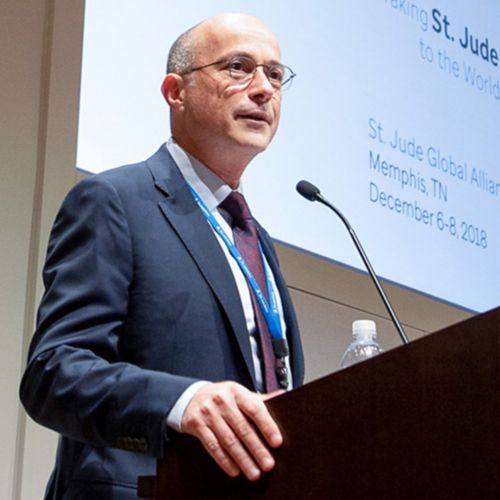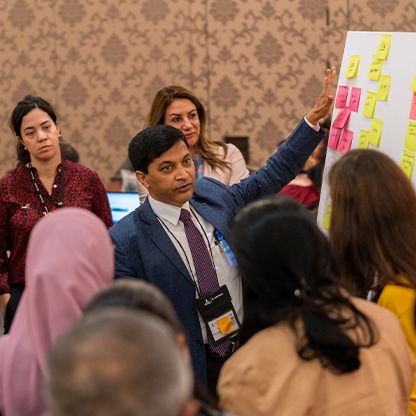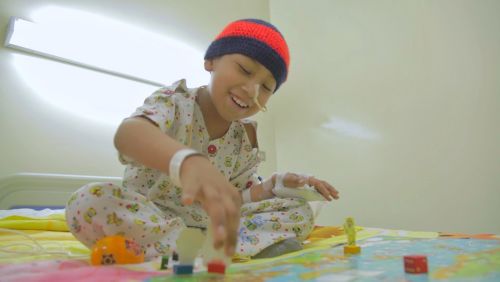St. Jude Family of Websites
Explore our cutting edge research, world-class patient care, career opportunities and more.
St. Jude Children's Research Hospital Home

- Fundraising
St. Jude Family of Websites
Explore our cutting edge research, world-class patient care, career opportunities and more.
St. Jude Children's Research Hospital Home

- Fundraising
Global Scholars: Dr. Rosdali Diaz Coronado
Other Global Scholars Projects:
Dr. Diaz uses patient voices to overcome barriers to care in Peru
Dr. Rosdali Diaz Coronado has always been drawn to the stories of patients.
In her first years at Universidad Nacional Pedro Ruiz Gallo in Lambayeque, Peru, Dr. Diaz would spend her summer vacations volunteering to work as much as possible in a university-affiliated hospital. Typically, students wouldn’t have direct contact with patients until rotations began in their fourth year, but Dr. Diaz was “desperate to start seeing patients.”
Those summer shifts gave her the opportunity to get practical experience cleaning wounds and observing surgeries — and interacting with patients.
“I enjoyed it because I felt that I could do something with my hands, that could help others,” she says. “I love to talk with the patients and hear their stories — like how they got those wounds. … I think that time is limited due to the workload in our settings. Everyone was very busy.”
Years later, as a pediatric oncologist at the National Cancer Institute in Peru, Dr. Diaz began to discover a whole new set of patient stories — ones that weren’t always told.
These stories have provided the inspiration for her Scholars Project.

Dr. Rosdali Diaz Coronado is working to understand the journeys or her patients in Peru so she can better plan strategies to help them get needed care sooner.
A 2022 graduate of the Master of Science in Global Child Health program, Dr. Diaz has focused her Scholars Project on the use of qualitative and quantitative research to identify barriers to the timely diagnosis and referral of patients with central nervous system (CNS) tumors in Peru. Barriers can include low awareness to diagnose brain tumors in pediatrics, difficulties in clear pathways for referral, expenses, and the travel required to reach a hospital, among other socio-cultural factors. Addressing the barriers in treating these conditions, Dr. Diaz says, is one of the most important steps her country can take to improve patient outcomes.
“I wanted to hear more,” Dr. Diaz says of the stories that families have started to tell her. “The parents, they have a lot of things to say.” She adds that families often don’t get a chance to share more of their stories because of the short time allotted to check them in and discuss the diagnosis, prognosis, and treatment options.
“They maybe want to tell us the way they feel, but they also understand that they are not allowed because of the time. … I wanted to mark the path of those children with brain tumors and give the parents a voice — that they need to be heard.”
Dr. Diaz hopes her Scholars Project will not only give these families that voice but also help gather and compile the data necessary to effect change. Relevant data may include the signs and symptoms that ultimately lead families to seek care, as well as where they first seek care. The better Dr. Diaz can understand these patients’ journeys, she believes, the better she can plan strategies for multiple stakeholders to address the trouble spots.
“To make people change, or to create a change in the systems,” she says, “I need to understand what are the determinants of these behaviors, why we continue to see those patients so late.”
Dr. Diaz has been drawn to these patients and their families since her days as a pediatric oncology fellow at Peru’s National Cancer Center. She remembers one day working with radiation services, when the radiologist and oncologist couldn’t agree on a treatment plan for a patient with complications. They did agree, however, that they needed a thorough review of medulloblastoma cases in general.
Everyone in the room turned toward her.
“I was like, ‘Oh my God.’ … I’m in trouble here,” says Dr. Diaz, who went on to compile and review 10 years of patient data on medulloblastoma cases in the hospital.
“I think that this task, this homework, marks my desire to understand [more about delays in diagnosis and treatment],” she says. “Just reading the records, and filling in my slides for my presentation, I was very curious again about this field.”
That curiosity led her to read articles by experts in the field, such as Dr. Amar Gajjar, who chairs the Department of Pediatric Medicine at St. Jude Children’s Research Hospital. She focused her thesis on medulloblastoma, and in the process, highlighted that treatment delays of more than 30 days to start radiotherapy after surgery are a leading negative influence on patient outcomes. She also traveled to Boston and St. Jude for observer programs.
Last March, after a nine-year journey and multiple iterations, Dr. Diaz had her thesis report published. She hopes that will inspire others to stay with it through hurdles they may face.
And indeed, her passion has been a hallmark to her career, from using her summer vacations to first see patients, to beginning her pediatric oncology fellowship just months after giving birth to her first child. “I had my doubts if I could be strong enough to complete the training,” she says, “but I think my desire to complete my pediatric oncology fellowship was stronger.”
Dr. Diaz first chose to pursue the field of medicine “mainly because I wanted to help people.” And it was actually the stories of two other patients that helped steer her toward the field of pediatric oncology.
The first came during college, when she interviewed a leukemia patient as part of a homework assignment. “It was a very touching story,” she says. “I think that was my first contact with a woman with leukemia.”
The second story related to a baby with leukemia who was being treated at her hospital during her internship. She watched all the work and coordination the hospital did to try to help the baby, but she only met the family once herself. However, a year later, she was headed to church with her family when she crossed paths with a mother handing out small tokens in memory of her baby.
It was the same baby.
“I just knew the baby once,” she says, “but I couldn’t forget her lovely face, and I couldn’t forget her mother.”
At one point, she thought she might become a surgeon. At another, she spent time gaining experience in the field of anesthesiology. But it was these two patients who helped guide her path to oncology — and eventually, to pediatric oncology.
“I feel like I have signs in my life. Very special signs,” she says. “I think that those two patients, I could not forget. I knew that maybe I could dedicate my life to this.”


